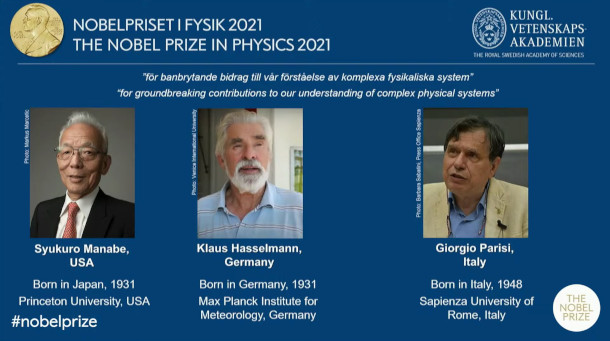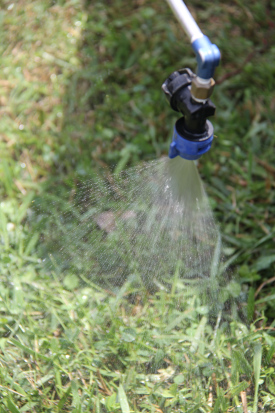Beyond the Headlines
Air Date: Week of October 15, 2021

This year’s Nobel Prize in Physics has been split among scientists Syukuro Manabe, Klaus Hasselmann, and Giorgio Parisi. (Screenshot from The Royal Swedish Academy of Sciences in Stockholm)
In this week’s trip beyond the headlines, Environmental Health News editor Peter Dykstra joins Host Steve Curwood to talk about the recent awarding of the Nobel Prize to three scientists who have made crucial contributions to the field of climate science. Next, the two discuss a study linking Lou Gehrig’s disease to pesticide use. Finally, they take a look through the history books to the oil embargo and gas lines in the United States in the 1970s.
Transcript
CURWOOD: It's that time of the broadcast when we turn to Peter Dykstra. Peter is an editor with Environmental Health News, that's EHN.org and DailyClimate.org. And he's going to take a look beyond the headlines for us from his perch there in Atlanta, Georgia. Hi there, Peter, what do you have for us today?
DYKSTRA: I have the second time that climate change has been the topic for the awarding of a Nobel prize, Syukuro Manabe, Klaus Hasselmann and Giorgio Parisi share the prize for three different studies, three different pieces of work, that quote in the words of the Nobel Committee, demonstrate that our knowledge about climate rests on solid science.
CURWOOD: What do these folks demonstrate through their research about climate change?
DYKSTRA: Well, Manabe is based at Princeton, and in 1967, we don't normally talk about climate change papers that were done so long ago, but he put together research and how increased levels of CO2 would lead to higher temperatures. That, of course, is one of the basic elements of climate change. And it led to the development of all future work in climate.
CURWOOD: And what about the other two folks?
DYKSTRA: Hasselmann is from Germany. Parisi is from Italy. They wrote separate papers on how, with Hasselmann, the melting ice in Greenland can eventually cause climate chaos around the world. And Parisi wrote a paper that was applied to climate change, about how many seemingly disparate things can come together to be the crisis we know now, and the crisis we'll know in the future.
CURWOOD: That's right, Peter, I wish it was going away, but I don't think it is yet. What do you have next for us?
DYKSTRA: Well, every year in the US there are approximately 5000 cases diagnosed of ALS, that's amyotrophic lateral sclerosis. It's also known in this country as Lou Gehrig's disease, because it struck down the baseball player in the late 1930s. What ALS does is it knocks out nerve cells that connect the brain to our muscles, and various bodily functions: the ability to walk and talk and eat, use your arms, use your legs are taken away, often in no more than two to five years. Although some ALS survivors can last a lot longer than that. The cure isn't known yet. But the research into the cause published in the journal, Neurotoxicology says that one of the causes may be linked to pesticide use.

Pesticides are linked to a number of health concerns, both acute and chronic. A new study is adding to this long list of negative health consequences by showing a link between pesticide use and Lou Gherig’s disease, also known as ALS. (Photo: Sharon Dowdy, UGA CAES, Flickr, CC BY-NC 2.0)
CURWOOD: But now we have a potential contributor - our pesticides?
DYKSTRA: Things like paraquat and a lot of very common pesticides used on crops around the world, may be a link to ALS. It's a new one and one that raises further concern that restrictions on some pesticides haven't gone far enough.
CURWOOD: But also raises hope that we may be able to address this killer disease. Let's turn now the history books and take a look back, tell me what do you see?
DYKSTRA: I see long gas lines back in the 1970s. The first of which started on October 17, 1973. The members of OPEC, the Organization of Petroleum Exporting Countries, were angered by the United States support for Israel in the Yom Kippur War, in which Israel defeated Egypt and Syria.
CURWOOD: And OPEC was largely made up of Middle Eastern countries.
DYKSTRA: That's right, countries that have a long standing conflict with Israel. What happened when that embargo was put in place, is that the energy crisis, as we called it here in the United States, saw gasoline prices quadrupled due to short supply. And that short supply created enormous gas lines at the pump.
CURWOOD: You know, fairly recently the people in the UK have seen gas lines with some problems getting petrol there. And of course, the price of natural gas has shot up rapidly. But instead of Middle Eastern countries involved in this, people are pointing the finger at Russia. And these gas lines, I think are rattling the public about things like the climate negotiations that are about to happen in Scotland.
DYKSTRA: That's right, and that'll be a topic front and center. We're also waiting to see what happens with legislation here in the US that would better enable a transition to clean energy.
CURWOOD: Alright, Peter. Well, thank you. Peter Dykstra is an editor with Environmental Health News, that's EHN.org and DailyClimate.org. And we will talk again real soon.
DYKSTRA: Sure will, Steve, thanks a lot.
CURWOOD: And there's more on these stories on the Living on Earth website. That's LOE.org.
Links
Environmental Health News | “Nobel Prize in Physics Honors Work on Climate Change”
Environmental Health News | “Higher Estimated Pesticide Exposures Linked to ALS Risk”
Living on Earth wants to hear from you!
Living on Earth
62 Calef Highway, Suite 212
Lee, NH 03861
Telephone: 617-287-4121
E-mail: comments@loe.org
Newsletter [Click here]
Donate to Living on Earth!
Living on Earth is an independent media program and relies entirely on contributions from listeners and institutions supporting public service. Please donate now to preserve an independent environmental voice.
NewsletterLiving on Earth offers a weekly delivery of the show's rundown to your mailbox. Sign up for our newsletter today!
 Sailors For The Sea: Be the change you want to sea.
Sailors For The Sea: Be the change you want to sea.
 The Grantham Foundation for the Protection of the Environment: Committed to protecting and improving the health of the global environment.
The Grantham Foundation for the Protection of the Environment: Committed to protecting and improving the health of the global environment.
 Contribute to Living on Earth and receive, as our gift to you, an archival print of one of Mark Seth Lender's extraordinary wildlife photographs. Follow the link to see Mark's current collection of photographs.
Contribute to Living on Earth and receive, as our gift to you, an archival print of one of Mark Seth Lender's extraordinary wildlife photographs. Follow the link to see Mark's current collection of photographs.
 Buy a signed copy of Mark Seth Lender's book Smeagull the Seagull & support Living on Earth
Buy a signed copy of Mark Seth Lender's book Smeagull the Seagull & support Living on Earth

